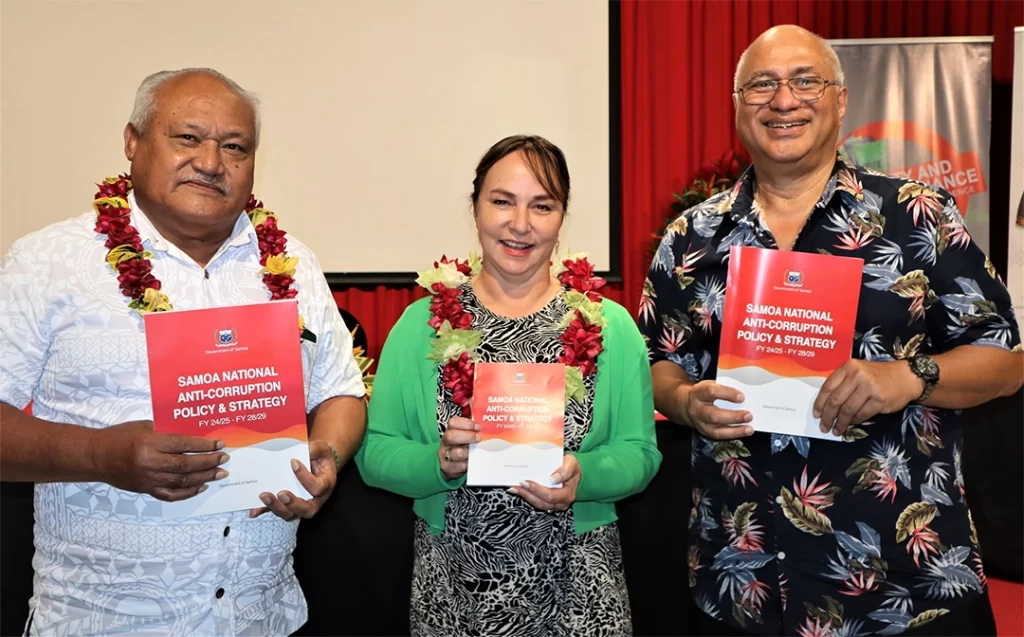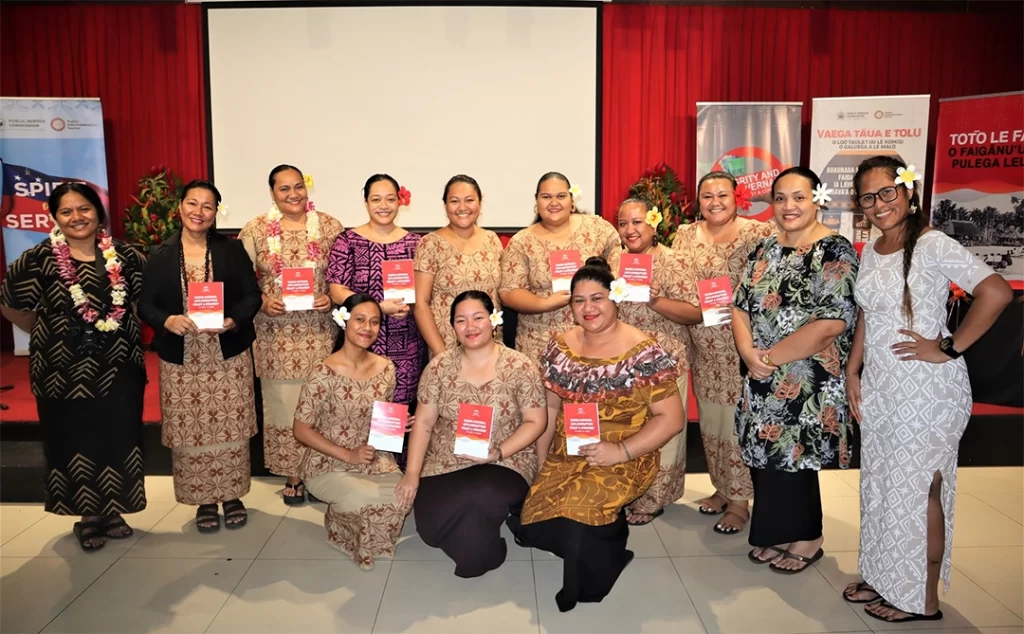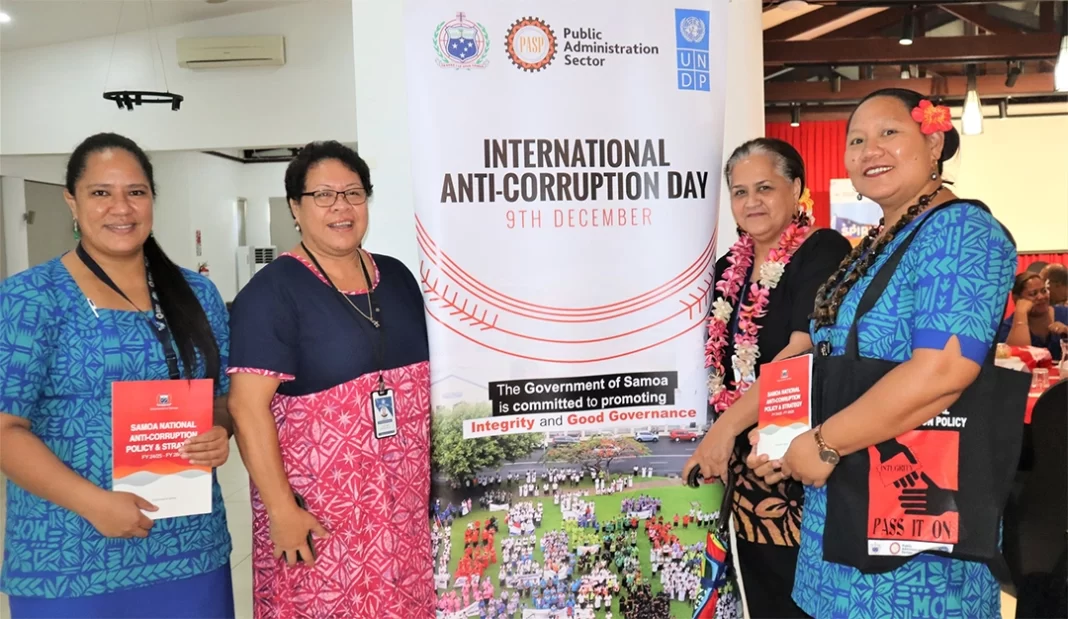The Samoan Government is serious about reducing and eliminating corruption across the country. To ensure that this vision of a Corrupt Free Samoa materializes and strengthens the trust of the general public in the Public Administration, the first-ever Samoa National Anti-Corruption Policy and Strategy was launched this morning at Tanoa Hotel in Sogi. The event was hosted by the Public Service Commission, which was tasked with ensuring the compilation of the Samoa National Anti-Corruption Policy and Strategy (FY 24/25 –FY 28/29). This is a milestone for Samoa as it is the first time that a policy and strategy of this kind has been created.
Prime Minister Fiame Naomi Mataafa, in the Policy’s Vision Statement filmed in a promotional video shown after the formalities, stated that when her government came into office in 2021, one of their priorities was to strengthen integrity and good governance in public administration and Samoa. “We have articulated this in our national development strategy, the Pathway for the Development of Samoa 2021/2022 -2025/2026 – that to ensure national security and trusted governance, we will put into place specific measures for anti-corruption and to improve public accountability and public sector efficiency and productivity.” This policy plays a crucial role in ensuring that corruption is combated in all its forms and, according to the Prime Minister, will “enable us to contribute towards strengthening integrity, good governance, security, and the rule of law in Samoa.”
Chairman of the Samoa Coordinating Committee for the Convention against Corruption, Nonu Saleimoa Vaai, in his Statement of Commitment in the Policy, states that NACP has been created as a good governance measure reflecting the people’s expectations and aspirations for Samoa to be a corrupt-free country. “It provides the public policy direction and plan of action to contribute towards fulfilling such aspirations,” he adds. The policy communicates “our efforts to fight, prevent, and address corruption in all its forms and manifestations across all sectors of Samoa.”
During her keynote address, Prime Minister Fiame stated that Samoa’s succession to the UN Convention against Corruption in 2018 recognizes the longstanding corruption that is present in all countries, irrespective of wealth or location in the world. She acknowledged that corruption is present not just in the Pacific region but in Samoa, and emphasized the threats it poses to the development of small island economies and the cohesiveness and stability of communities. Corruption is often seen as a “technical problem” with “unclear parameters when viewed with our culture and local context,” said the Prime Minister. However, “given the insidious nature of corruption, the cost of inaction is high.”
Quoting the United Nations Secretary-General in his speech in 2018 celebrating Anti-Corruption Day, Prime Minister Fiame said that corruption “robs societies of schools, hospitals, and other vital services, drives away foreign investment, and strips nations of their natural resources.” She pointed out that “Samoa continues to make notable strides in her commitment to fully realize the global, regional, and national agendas for sustainable development.” The NACP “reflects steps taken to strengthen governance, accountability mechanisms, and build institutional and agency capacities to combat corruption through enhanced prevention and deterrence measures, if implemented right,” she said. This will ensure that “our systems work and provide a road map to further strengthen good governance, leadership, and integrity in Samoa. The vision is simple: a corrupt-free Samoa.”

She urged Samoa to strive to be known as a nation with integrity. Although hard to do, it is not impossible. “At the heart of it all are accountable, citizen-focused institutions at all three levels of government: the executive, judiciary, and parliament, with the latter being at the peak of our democratic system.” Fiame said that “independent integrity institutions free of political interference are an important layer of any anti-corruption framework.” This is why the Government of Samoa has directed existing integrity organizations, such as the Public Service Commission, the Samoa Audit Office, the Office of the Ombudsman, the Office of the Attorney General, Police, and others, to start laying the foundation for the establishment of an integrity commission in the near future.
“The important role of parliament in ensuring the achievement of a corrupt-free Samoa must be underscored, as it has the constitutional mandate to both oversee government and hold the government to account,” says the Prime Minister. Parliament is where laws are passed, permission to spend public funds on government policies is given, all the while remaining accountable to the public through Members of Parliament. “The commitment to revisiting areas such as the development of leadership at the political level and finding solutions to the issue of culture and corruption in elections is acknowledgment that technical solutions are not enough to address corruption,” she said. Having political leadership that must observe the standards of integrity, transparency, and accountability required of good governance practices is crucial. Without this political will at the highest level, anti-corruption efforts will also struggle to succeed and produce the desired outcomes.

“We are also aware of the consequences of the absence of trust and confidence of people in their political leadership in governments or, for that matter, the diminished credibility of a country when engaging with partners that are trying to help.” She called on all those in the room to work together to push for the success of this policy. “Colleagues, the success of this policy rests on all of us: the Parliament, the Judiciary, the Executive Government, the Private Sector, Civil Society, our communities, and our development partners.”
The Prime Minister also acknowledged the media, being mindful and grateful for the important role they play in holding the Government accountable for their actions and inactions. “Hence the continuing pursuit for easier public access to public information through the development of the Right to Information framework.” Now that the policy is done, she said the next step is to ensure early implementation and that the implementers are adequately resourced so they can effectively operate independently and without fear of reprisal or intimidation in their roles and responsibilities. The Prime Minister also revealed that internationally, Samoa has had two reviews done by selected country teams, supported by the UN Office on Drugs and Crime and the UN Convention against Corruption team, with resultant outcomes recommending further legislative review of Samoa’s Crimes Act to strengthen anti-corruption measures.
She extended her appreciation to the United Nations Development Programme (UNDP), UNODC, Government of Australia, and all our development partners for their technical support towards this work. “I also thank our valued stakeholders, particularly Sui o nuu and Sui o tamaitai, the Council of Churches, the Private sector, Regional partners, and all Government agencies that contributed towards this Anti-Corruption Policy.”
UNDP Resident Representative in Samoa, Aliona Niculita, delivered remarks at the event. Reverend Dr. Latu Latai of the Congregational Christian Church of Apia conducted the invocation.
Article authored by Asmine Netzler-Iose.






